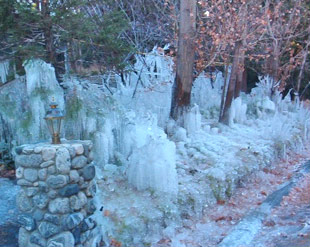Winter in the the Metro Detroit area has its ups and downs, temperature-wise. One day, it’s comfortable and sunny, but the next day, it can drop down below freezing. And those temperature swings and freezes can cause havoc with your outdoor irrigation system. Whether you face frozen pipes or some other form of winter pipe damage, you could end up with a flooded lawn and pricey landscaping problems and home exterior issues in the blink of an eye.
Fortunately, there are steps you can take to prevent the need for irrigation repair. At Emerald Rich we love helping homeowners understand how to care for every inch of their outdoor spaces, including their often-overlooked irrigation system and outdoor faucets. Your home’s exterior can remain secure and beautiful all year long, even during winter cold snaps. Here’s what you need to know to protect those outdoor pipe systems.
How Cold Temperatures Affect Your Sprinkler Systems
Homeowners know that when the temperature drops below freezing, pipes can be at risk. But it’s still easy to overlook sprinklers and outdoor faucets because in winter, we’re simply not using those plumbing systems regularly.
The problem, of course, is that your outside pipes can freeze, resulting in burst pipes and needed irrigation repair. Some of the items that can be susceptible to damage from freezing temperatures are:
- Sprinkler heads
- Manifolds
- Pipes
- Faucets
As water freezes, it expands, putting pressure on all these elements of your irrigation system. Elements of the system can burst, break, malfunction, and leak, leading to problems such as dangerous ice pooling on walkways and driveway, and puddling around your home, which can damage your house’s foundation. And of course, your irrigation system could end up needing repair or replacement too.
Steps to Prevent a Freeze or Break in Your Irrigation System
The best way to avoid damage to your outdoor pipes and sprinklers is to take steps to winterize your irrigation system before cold weather hits.
- Put away hoses — Detach hoses from outdoor faucets. Ensure hoses are drained of water. Coil them and store in your garage or shed.
- Cover outdoor faucets — Tightly close any outdoor faucets you have. Then secure a foam faucet cover over the faucet to insulate it during winter.
- Insulate above-ground pipes — Wrap your sprinkler system’s main shut-off valve with insulation. If there are any pipes above ground, wrap them in insulating tape.
- Turn off timers — Programming sprinklers to turn on during the week is great in spring and summer, but in cold weather, it’s a no-no. Turn off these settings to ensure you’re not creating opportunities to allow pipes to freeze. You’ll also be preventing ice from forming on the street from sprinkler run-off — and your neighbors will be grateful for that.
What to Do if You Experience Damage to Your Sprinklers
You may notice water is leaking. If you know it is your sprinkler system, then take the following steps immediately:
- Turn off water supply — Shut off any water leading to outdoor pipes.
- Inspect — Examine every part of the irrigation system that is visible, looking for winter pipe damage.
- Take note — Notice any areas where puddles are forming or signs of broken sprinkler features. That way, you’ll know where to point your repair people so they can get started on their repairs quickly.
- Call for help — Contact your landscaping contractor to arrange for irrigation repair as soon as possible.
If you are not sure where the leak is coming from, there are several ways to test your sprinklers.
- Manifold — This box is partly buried, but you’ll probably find it by its colorful lid. Open it and check the valves for signs of cracks. If any are broken, they’ll need to be replaced.
- Above-ground pipes — Run the system and look for spraying or gushing water along the part of the pipes that are visible.
- Below-ground pipes — Check for leaks by running the sprinklers for 30 minutes. Then turn everything off and look for pooled water. The broken pipe will be near there.
- Sprinkler heads — Run the system for several minutes, looking for leaks at the base of the heads and gushing water.
Don’t Wait Too Long to Get Needed Repairs
The last thing you want to do is risk further damage by leaving broken or frozen irrigation pipes untended. Addressing the issue is necessary to protect your landscaping and your home from even more damage from moisture, leaking, mold, and mildew.
The best solution is to call Emerald Rich to help. Unlike many other do-it-yourself projects, anything that involves water systems can be time-consuming and complicated. There are techniques that the pros know and can perform with ease. And a professional contractor will also understand how to ensure your irrigation system meets municipal codes, homeowners association requirements, and more.
There’s no need to stress about these details! Our team at Emerald Rich has installed and maintained superb irrigation systems throughout the Metro Detroit area. We can get to you quickly, find the problem fast, and get it fixed with top-notch materials so you can relax and enjoy your beautiful home. Contact us today to schedule a free consultation and estimate.734-479-1234

